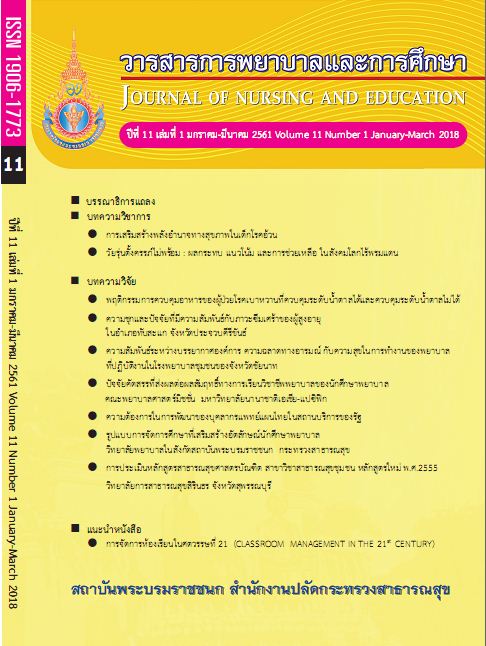Needs of Self Development among Thai Traditional Medicine Personnel in Health Care Units
ความต้องการในการพัฒนาของบุคลากรแพทย์แผนไทยในสถานบริการของรัฐ
คำสำคัญ:
ความต้องการ, การพัฒนาบุคลากร, แพทย์แผนไทย, สถานบริการของรัฐบทคัดย่อ
บทคัดย่อ
การวิจัยเชิงบรรยายครั้งนี้ มีวัตถุประสงค์เพื่อศึกษาความต้องการพัฒนาบุคลากรแพทย์แผนไทยในสถานบริการของรัฐ และปัจจัยที่มีความสัมพันธ์ โดยกลุ่มตัวอย่างเป็นบุคลากรแพทย์แผนไทยของสถานบริการสุขภาพของรัฐ จำนวน 428 คน รวบรวมข้อมูลโดยใช้แบบสอบถามความต้องการด้านการพัฒนาบุคลากร วิเคราะห์ข้อมูลโดยการหาค่าร้อยละ ค่าเฉลี่ย ส่วนเบี่ยงเบนมาตรฐาน และค่าสถิติทดสอบ Chi-square ผลการวิจัย พบว่า บุคลากรแพทย์แผนไทยในสถานบริการของรัฐ มีความต้องการพัฒนาตนเองภาพรวมอยู่ในระดับมาก (Mean = 4.27, S.D. = 0.75) โดยด้านการปฏิบัติการ ต้องการพัฒนาการตรวจวินิจฉัยโรคทางการแพทย์แผนไทยสูงสุด (Mean = 4.60, S.D. = 0.62) ด้านการวางแผน ต้องการพัฒนาการจัดการและการป้องกันความเสี่ยงที่อาจจะเกิดกับงานแพทย์แผนไทยสูงสุด (Mean = 4.37, S.D. = 0.68) ด้านการประสานงาน ต้องการพัฒนาการประสานงานแนวทาง OPD แพทย์แผนไทยคู่ขนานกับแผนปัจจุบันสูงสุด (Mean = 4.34, S.D. = 0.80) และด้านการบริการ ต้องการพัฒนาการให้การปรึกษาและคำแนะนำแก่ผู้รับบริการสูงสุด (Mean = 4.32, S.D. = 0.72) ปัจจัยด้านเพศ ประเภทสถานบริการ และประสบการณ์การทำงานแพทย์แผนไทยไม่มีความสัมพันธ์กับความต้องการในการพัฒนาตนเองของบุคลากรแพทย์แผนไทยในสถานบริการของรัฐ ผลการศึกษาวิจัยครั้งนี้ สถาบันทางการศึกษาสามารถนำไปใช้เป็นข้อมูลในการจัดอบรมเพื่อพัฒนาศักยภาพของบุคลกรด้านการแพทย์แผนไทยในสถานบริการสุขภาพของรัฐได้
เอกสารอ้างอิง
1. Chokwiwat, V. Policies and directions for Thai traditional medicine development and Alternative Medicine of Thailand. Bangkok: War Veteran Organization Printing House, 2003. (in Thai)
2. Bureau of Policy and Strategy, Ministry of Public Health. Strategic, indicators, and storage guidelines, Ministry of Public Health in 2006. Nonthaburi: Ministry of Public Health, 2006. (in Thai)
3. Office of the National Economic and Social Development Board. The 10th National Economic and Social Development Plan (2007-2011) Bangkok, 2007. (in Thai)
4. Chantraket, R., Phetrakad, P. & Limpananon, J. Situation of Service and human resources Thai Traditional Medicine Service In public health services. Department for development of Thai traditional and alternative medicine, Bangkok, 2016. (in Thai)
5. Saiyod, L. & Saiyod, A. Research statistics. Bangkok: Suviriyasarn, 2000. (in Thai)
6. Ruangdej, K., chaosuansreecharoen, P., Mohamad, K. & Mahama, F. Teaching-learning Curriculum History of Praboromarajchanok Institute for Health Workforce Providing Thai Traditional Medicine and Survey of Situation of Health Workforce Providing Thai Traditional Medicine in Public Health Facilities. Praboromarajchanok institute for health workforce development, Ministry of Public Health, 2010. (in Thai)
7. Nittayanggoon, S. & Anurat, T. The study of personnel development requirements on Thai Traditional Medicine and Alternative Medicine. Journal of Nursing and Education, 2015; 8(1): 41-58. (in Thai)
8. Phokapun, P., Leethongdee, S. & Tikkapanyo, C. The Quality Improvement of Clinical Risk Management System for Care Standard of In-patient Care of Nurses in the Fort Sunpasitthiprasong Hospital, Ubon Ratchathani Province. Journal of the Royal Thai Army Nurses, 2012; 13(2): 38-48. (in Thai)
9. Budsayaplakorn, B., et al. A Study on the Capacity of Health Service Centers Located along Thai Borders to Prepared and Provided for Becoming the Hub of Health Services for the Forthcoming ASEAN Community in 2013. Nonthaburi: Bureau of Health Administration, Ministry of Public Health, 2013. (in Thai)
10. Kiewying, M., Leelakraiwan, J., Suwunakom, S. & Anusornteerakul, S. The Implementation of Health Counseling Services a Strategy to Prevent AIDS, Thailand. KKU Research Journal, 1997; 8(2): 10-17. (in Thai)
11. Nakgul, L., Thridech, P., Phandii, W. & Siri, S. Needs of Self Development among Ramathibodi Hospital Personnel. Journal of Boromarajonani College of Nursing, Bangkok, 2014; 30(1): 22-33. (in Thai)






